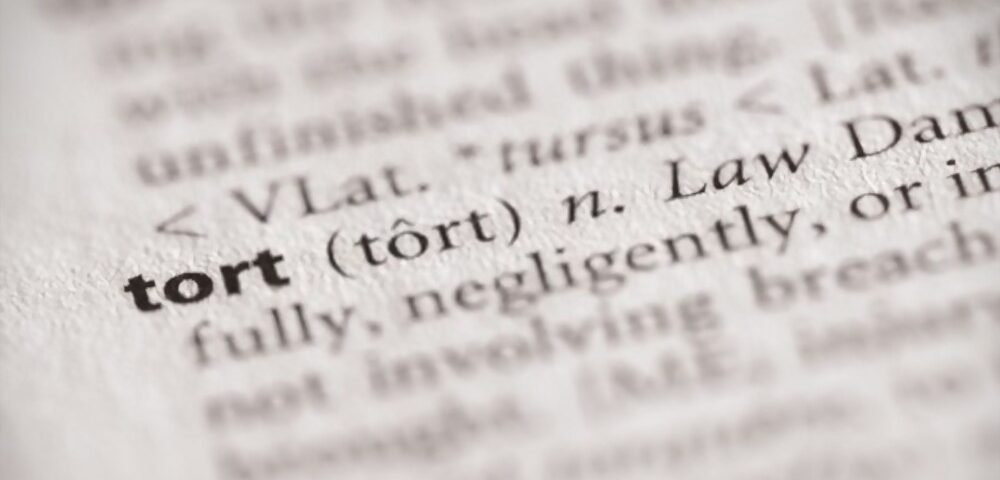What is a Tort?

In simple terms, a tort is an act or omission that produces harm or injury to another person. By reason of such injury as a result of the violation of a right of the injured person, the latter thus uses tort as the basis for his or her legal claim.
With regard to how it is defined in the law, a Georgia statute states that a tort is “the unlawful violation of a private legal right other than a mere breach of contract, express or implied”. In other words, for an act or omission to be considered a tort, it should not be based on a violation of a contract between two parties; the would-be defendant and the injured party do not necessarily have any pre-existing contractual relations between them in order for a tort action to be possible.
Concrete examples of a tort would include personal injury cases, such as car collisions and slip and fall accidents, where injuries are allegedly caused by the act or omission of the defendant, with whom the claiming party does not have an existing contractual relationship.
What are the Basic Elements of a Tort?
The basic elements of a tort are the existence of a duty, breach of duty, and injury resulting from the breach. For a cause of action based on tort to arise, a claimant must prove that the above elements are present given the facts and circumstances. Otherwise, there is no tort, so there is most likely no right to claim from the other person.
Let us go over them one by one.
Existence of a duty
This element refers to the duty of the defendant, or the person the claimant wants to demand liability from, to take steps to exercise due diligence and prevent an injury from happening. If there is no duty on the part of the other person, then the injury that the claimant alleges to have occurred cannot be blamed on that person, precisely because he has no duty under the law to prevent it.
For example, there exists a duty on the part of a property owner to ensure that the premises of their property are clear from dangerous hazards. A victim of a slip and fall, then, would need to establish that they are claiming against the proper person, that is, the property owner and that this person indeed had the duty to prevent the slip and fall from happening but failed to do so.
Breach of a duty
That failure to do so, as mentioned above, is precisely what this second element is all about. Breach is legally defined as “a violation in the performance of or a failure to perform any obligation created by a promise, duty, or law without excuse or justification”.
In the same example, a property owner can be said to be in breach of his or her duty when, for instance, there was a failure to put up caution signs in slippery surfaces or areas with ongoing construction or maybe a failure to make repairs on broken handrails. As property owners are principally expected to maintain their property in good condition and ensure the safety of tenants or guests within its premises, the law sanctions breach of this duty by way of a tort claim.
Injury resulting from the breach
This last element pertains to the proximate cause of the injury. In other words, an injured party claiming based on a tort cannot do so if it were something else that caused the injury and not the breach of duty of the defendant. It must be proved that it was the actions of the defendant that led to the injury, so as to allow to claim damages in favor of the injured party.
Going back to the slip and fall example, if the accident that occurred was, in fact, a result of the negligence on the part of the injured party, i.e., total disregard of the caution signs set up by the property owner, then the claim may not prosper. In this case, the injury was not a result of the breach but of the injured party’s lack of care and diligence.
How to claim based on a tort
Basically, then, a claim based on a tort would only succeed if these elements are clearly proven by the claiming party. To summarize, there must be a duty on the part of the defendant to prevent an injury from happening, a breach of such duty, and an injury that is the direct cause of the breach. Note that a common defense for tort claims is negligence on the part of the plaintiff, so a person’s contributory negligence should be plainly absent, too, in order for the claim to prosper.
In claims based on a tort, the task of a personal injury lawyer is, first and foremost, to assess your case based on the facts and circumstances, determine the fair amount you are entitled to as a tort victim, facilitate negotiations, and, of course, assist in the judicial process should you and the opposing party eventually decide to take matters to court.
Musgrove Trial Firm is here to help in tort cases in the Atlanta area. Located in Norcross, Georgia, Musgrove is composed of a team of highly skilled and competent personal injury lawyers, who will be able to assist in tort claims and guide you through the whole personal injury settlement process.
Our office is open and ready to hear your case. Send us a message on our website or give us a call for immediate assistance.
